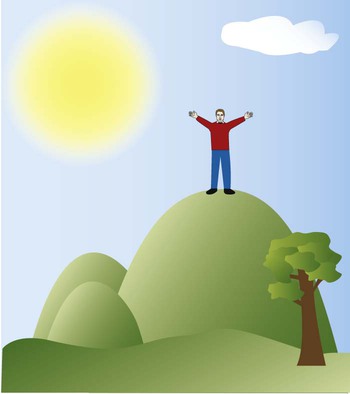Chapter 3 Health professions are physically and mentally demanding. The fast-paced environment is full of problems to solve and decisions to make. The work requires good judgment because answers are rarely black and white. A lot is at stake, including lives. It takes a lot of energy and persistence to be a health professional (Figure 3-1). * guide a confused and fragile patient * find an artery to take blood * communicate with someone who speaks little English or who is deaf * document a difficult incident * make sense of a cluster of lab results * dispense medications correctly, determine blood gases, improve a client’s range of motion, enter reimbursement codes for patients with multiple diagnoses and treatments The list is virtually endless. You need strategies to build, maintain, and boost your energy. * Breathe deeply ten times, exhaling twice as long as you inhale. Concentrating on your breathing delivers oxygen to your brain and, more importantly, takes your mind off of everything else. * Stretching or rolling your head around in a circle can also restore your equilibrium. * Accomplish small tasks leading up to larger projects. * Plan bursts of activity. Spend 50 minutes on an important activity, followed by a preplanned 10-minute break doing something else you enjoy. * If all else fails, get some fresh air by taking a walk outside. * Eat snacks that release energy slowly, like bananas, yogurt, trail mix, nuts, peanut butter on an apple, berries, or granola. * Avoid sweets, junk food, and energy drinks that contain excessive sugar. * Use caffeine sparingly but strategically. Try tea for its antioxidants. Or eat a small piece of chocolate for the caffeine and endorphin stimulation. * Finally, take a daily multivitamin rich in vitamin C and B vitamins. Try the following strategies for an energy boost: * Wash your face, hands, and wrists in cold water to stimulate circulation. * Apply a cool, damp compress to hydrate and relieve the area around your eyes. * Look on the bright side of a problem or tedious task. Can you learn something new? Can you remind yourself to see the value of what you are doing? This small attitude adjustment can restore interest and energy. * If you are allowed to do so at work or on your breaks, listen to music. * Close your eyes for a few minutes and let your cares draw away. * If your energy depletion is severe, and if permitted, take a 20-minute nap—but no longer. You don’t want to descend into deep sleep and wake up more groggy than refreshed. * Avoid energy-sapping activities in the middle of a demanding routine, such as television, Internet, and email. Other unconventional ideas are included in Box 3-1. Breakfast is an important part of such a program because it “breaks” the “fast” of sleeping all night, giving your body a much needed injection of blood sugar to start your day off right. After that, select protein, healthy fats, and carbohydrates that are low on the glycemic index and full of soluble and insoluble fiber (Box 3-2). Low-glycemic carbohydrates release sugars slowly and promote a feeling of fullness. Adding these foods to your diet will help to prevent blood sugar spikes and insulin surges that deplete sugars from the blood and prepare them for storage as fat.
Gaining Energy and Reducing Stress
 Build energy to support perseverance.
Build energy to support perseverance.
 Differentiate between short-term and long-term energy-building strategies.
Differentiate between short-term and long-term energy-building strategies.
 State why drug abuse and dependency are a special risk for health care professionals.
State why drug abuse and dependency are a special risk for health care professionals.
 Know what to do if a co-worker uses or diverts drugs.
Know what to do if a co-worker uses or diverts drugs.
 Gain insight into the physiological aspects of stress.
Gain insight into the physiological aspects of stress.
Gaining Energy, Persistence, and Perseverance
Learning Objectives for Gaining Energy, Persistence, and Perseverance
 Name the basic elements of human energy.
Name the basic elements of human energy.
 Apply strategies for boosting your energy when you need a lift.
Apply strategies for boosting your energy when you need a lift.
 Know long-term strategies for developing higher energy.
Know long-term strategies for developing higher energy.
Short-term Strategies for Boosting Energy
Activity Tools
Nutritional Tools
Refreshment Tools
Long-term Strategies for Gaining Energy
Evaluate Your Diet
Nurse Key
Fastest Nurse Insight Engine
Get Clinical Tree app for offline access




















